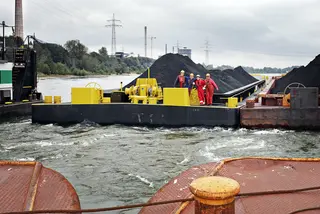As part of the Danube SKILLS project, so-called one-stop shops are set up to serve as public information points providing free available services for (potential) customers of Danube logistics services. These one-stop-shops will ensure a quick and easy access to logistics-relevant information in order to foster a modal shift to inland waterway transport. At the same time, Danube SKILLS focuses on professional nautical education with the aim to create uniform training standards along the entire Danube.
The quality of public information services focusing on the Danube logistics sector varies widely between all ten riparian countries: Therefore the main goal of Danube SKILLS is to create a uniform service level regarding the provision of data and information on Danube navigation. The strategy is to bundle information at one-stop-shops and provide an easy and free of charge access for potential customers of Danube logistics services.
In Austria, online platforms such as the Danube Logistics Portal or the DoRIS website as well as the Manual on Danube Navigation are already part of the established information services. An optimized information exchange along the entire Danube will directly support the industry and the logistics sector in planning inland waterway transport and will contribute to an improvement of transport safety. In the long run, the awareness for potentials linked to Danube navigation will increase and an effective modal shift towards the waterway will become possible.
During the last Danube SKILLS Meeting in mid-September in Vienna, the project partners developed a joint work programme in which the concrete services of future one-stop-shops were defined. The work programme will be implemented jointly over the next two years by all project partners.
A high service level at Danube SKILLS goes hand in hand with common nautical training standards in inland navigation. In addition to the provision of market-neutral information on the Danube logistics sector, Danube SKILLS aims at uniform and international recognized minimum requirements for nautical training. Therefore, jointly developed nautical education standards are an important goal to obtain certificates which are transnationally accepted.
The project partners will therefore not only contribute to the economic development in the Danube region, but also to an increase of quality regarding a competent and safety-conscious education for the occupational group.
Further information is available on the project website, Twitter and Facebook.

